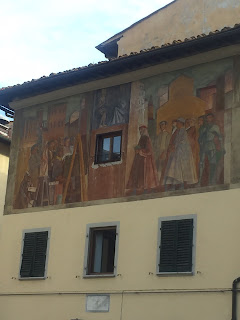Into the Wolf´s Mouth
 |
| The Duomo and Baptistry, Florence |
I remember traveling in the mid-90’s, even before I learned
Spanish, hearing the announcements over the loudspeaker during a layover in the
Rome airport. They were probably just telling people not to park in the loading
zone, but I was absolutely enraptured by the rhythm and musicality of the
Italian language. And now here I am twenty years hence, preparing to travel
to Italy to study Italian for six weeks, one of those fabulous things academics
get to do a few times in a career. Six weeks in Florence (Margaret with me for
the first month)? Are you kidding? Due cappuccini, per
favore! It will be awesome. But (maybe as proof that I´m incapable of just enjoying something) I’ve put some pressure on myself in this
endeavor by committing to come back and teach Elementary Italian in the fall.
At least two people inspired me to attempt to navigate this “learn
to teach” process. One is Johnny Wink, my brilliant friend and colleague, polyglot, and locally
world famous autodidact. Johnny never met a language he didn’t like, and
routinely studies about six languages. He taught himself Latin and is now a
great Latin teacher, treasured by generations of students.
The other guy is Robert Anthony Siegel, the leader of my week-long
writer’s workshop in Iowa City a few years ago. In addition to our main sessions
in the mornings and afternoons, we’d have a lunch hour presentation on one
theme or another. One of those presentations featured Robert, who started his
talk by saying, “I wanted to do this presentation on flash fiction because I
didn’t know much about it.” I thought, “That’s a bold man right there.”
Normally we only want to teach subjects on which we consider ourselves to be
experts, not what we want to learn about.
And I’m motivated by the omnipresent doubters, like Bob
Neller, my boss at Camp Lejeune (now a 4-star general and Commandant of the Marine Corps) who told me in 1997 that I’d never
get further in Spanish than possibly being able to order a meal, and another friend of mine who told me I´m too old to do this.
So I’m cramming as much elementary Italian in my brain as I
can, the same way I learned Spanish, starting with phrases of greeting and
introduction, making flashcards with regular verbs ending in -are, then -ere,
then -ire. Then studying the irregular present verbs, numbers, vocabulary and
pronunciation. Knowing what syllable to emphasize in Italian seems to be much
more complicated than in Spanish, and I’ve been very slow to pick up on the
pronunciation differences between cchi vs. ci / ce.
As I face all I should learn between now and when I leave in
a month, many doubts assail me: will our kids do a good job of taking care of
themselves and the house while we´re gone? Will I be able to learn Italian well
enough to be an effective teacher? Will my brain full of Spanish and dormant rudimentary
Brazilian Portuguese help or hinder my learning? Is my increasingly less plastic brain still flexible enough to learn something as complex as a new language? I’ll
be essentially another student in the classroom with college students. That is
certain to be awkward. Nobody goes on study abroad hoping to hang out with some
old grey haired dude on the back nine of life.
I´m determined to force myself to think more about what will be great about
this trip than what will be difficult: to have Margaret, the greatest travel
partner ever, there with me the first month and to roam around Florence and
Tuscany with her; to get where I´m conversational, and then, maybe, comfortable
in basic Italian, to see other language teachers in action and pick up tips for how
to be a more effective teacher of language; to unplug totally from the familiar
and routine . . . it will all be great.
. . . but not
pressure free. Several agencies and departments around my University helped me
fund this trip with the reasonable expectation of a payoff: that I come back
here ready to teach what I´ve learned. Pressure is not bad, though. No pressure, no diamonds.
The Italian phrase to wish someone good luck on a
challenging endeavor is “in bocca al lupo” or “in the wolf´s mouth” somewhat
similar to the equally odd “break a leg” to mean good luck to performers about
to take the stage. The proper response is supposed to be “Crepi” (May the wolf
die).
So here goes . . . it´s the wolf or me.


